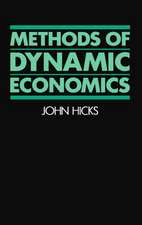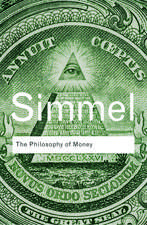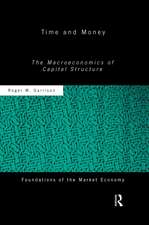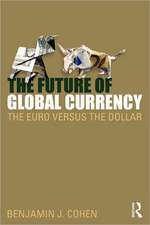The New Economy and Macroeconomic Stability: A Neo-Modern Perspective Drawing on the Complexity Approach and Keynesian Economics: Routledge Frontiers of Political Economy
Autor Dario Togatien Limba Engleză Paperback – 18 sep 2009
* information technology
* globalization
* the increasing significance of intangibles and financial markets.
This ground-breaking book utilizes a ‘neo-modern’ perspective drawing on complexity theory to advance the study of the stability and dynamic behaviour of economic systems. Togati utilizes the Calvino labels to identify new empirical evidence, and examines the implications for global stability based on New Classical Macroeconomics and Keynsian theory.
The analysis developed in this book has important practical and policy implications for the New Economy, making this book essential reading for students, academics and practitioners in this field.
| Toate formatele și edițiile | Preț | Express |
|---|---|---|
| Paperback (1) | 416.82 lei 6-8 săpt. | |
| Taylor & Francis – 18 sep 2009 | 416.82 lei 6-8 săpt. | |
| Hardback (1) | 1117.40 lei 6-8 săpt. | |
| Taylor & Francis – 15 dec 2005 | 1117.40 lei 6-8 săpt. |
Din seria Routledge Frontiers of Political Economy
-
 Preț: 309.90 lei
Preț: 309.90 lei -
 Preț: 309.79 lei
Preț: 309.79 lei -
 Preț: 316.03 lei
Preț: 316.03 lei -
 Preț: 310.95 lei
Preț: 310.95 lei - 9%
 Preț: 866.82 lei
Preț: 866.82 lei -
 Preț: 309.12 lei
Preț: 309.12 lei -
 Preț: 311.61 lei
Preț: 311.61 lei -
 Preț: 286.99 lei
Preț: 286.99 lei -
 Preț: 327.83 lei
Preț: 327.83 lei -
 Preț: 311.87 lei
Preț: 311.87 lei -
 Preț: 302.76 lei
Preț: 302.76 lei - 9%
 Preț: 938.48 lei
Preț: 938.48 lei -
 Preț: 152.67 lei
Preț: 152.67 lei -
 Preț: 151.97 lei
Preț: 151.97 lei -
 Preț: 318.54 lei
Preț: 318.54 lei -
 Preț: 317.95 lei
Preț: 317.95 lei -
 Preț: 310.01 lei
Preț: 310.01 lei -
 Preț: 326.49 lei
Preț: 326.49 lei -
 Preț: 155.44 lei
Preț: 155.44 lei -
 Preț: 309.79 lei
Preț: 309.79 lei -
 Preț: 328.76 lei
Preț: 328.76 lei -
 Preț: 281.72 lei
Preț: 281.72 lei -
 Preț: 286.58 lei
Preț: 286.58 lei -
 Preț: 386.12 lei
Preț: 386.12 lei -
 Preț: 353.78 lei
Preț: 353.78 lei -
 Preț: 325.09 lei
Preț: 325.09 lei -
 Preț: 310.55 lei
Preț: 310.55 lei -
 Preț: 371.95 lei
Preț: 371.95 lei -
 Preț: 324.87 lei
Preț: 324.87 lei -
 Preț: 312.86 lei
Preț: 312.86 lei -
 Preț: 374.16 lei
Preț: 374.16 lei -
 Preț: 329.09 lei
Preț: 329.09 lei -
 Preț: 348.22 lei
Preț: 348.22 lei - 28%
 Preț: 1047.06 lei
Preț: 1047.06 lei - 18%
 Preț: 1169.45 lei
Preț: 1169.45 lei - 18%
 Preț: 1555.17 lei
Preț: 1555.17 lei - 18%
 Preț: 1048.43 lei
Preț: 1048.43 lei - 18%
 Preț: 1059.84 lei
Preț: 1059.84 lei - 31%
 Preț: 767.47 lei
Preț: 767.47 lei - 18%
 Preț: 731.92 lei
Preț: 731.92 lei - 26%
 Preț: 822.54 lei
Preț: 822.54 lei - 18%
 Preț: 1796.21 lei
Preț: 1796.21 lei - 26%
 Preț: 1184.91 lei
Preț: 1184.91 lei - 18%
 Preț: 1120.23 lei
Preț: 1120.23 lei - 15%
 Preț: 700.95 lei
Preț: 700.95 lei - 18%
 Preț: 1116.31 lei
Preț: 1116.31 lei - 22%
 Preț: 299.52 lei
Preț: 299.52 lei
Preț: 416.82 lei
Nou
Puncte Express: 625
Preț estimativ în valută:
79.76€ • 85.29$ • 66.50£
79.76€ • 85.29$ • 66.50£
Carte tipărită la comandă
Livrare economică 18 aprilie-02 mai
Preluare comenzi: 021 569.72.76
Specificații
ISBN-13: 9780415547727
ISBN-10: 0415547725
Pagini: 332
Ilustrații: 2 b/w images and 2 line drawings
Dimensiuni: 156 x 234 x 18 mm
Greutate: 0.47 kg
Ediția:1
Editura: Taylor & Francis
Colecția Routledge
Seria Routledge Frontiers of Political Economy
Locul publicării:Oxford, United Kingdom
ISBN-10: 0415547725
Pagini: 332
Ilustrații: 2 b/w images and 2 line drawings
Dimensiuni: 156 x 234 x 18 mm
Greutate: 0.47 kg
Ediția:1
Editura: Taylor & Francis
Colecția Routledge
Seria Routledge Frontiers of Political Economy
Locul publicării:Oxford, United Kingdom
Public țintă
Postgraduate and ProfessionalCuprins
List of Figures Preface Introduction 1. Equilibrium without Structural Change 2. Instability and Dynamic Equilibrium 3. Structural Change without Equilibrium 4. The Crisis in Economic Theory and the Neo-modern Perspective 5. Complexity Theory 6. The Key Steps in our Simplification Strategy 7. The Neoclassical Macro Model 8. Keynes’s Macro Model 9. Some Key Differences Between Keynes and the ‘Classics’ 10. A Broad Definition of the New Economy 11. Multiplicity 12. Rapidity 13. Lightness 14. Precision 15. Visibility 16. New Classical Macroeconomics 17. New Classical Macroeconomics and the Key Features of the New Economy 18. Keynesian Theory and the New Economy: An Overview 19. Keynesian Theory and Multiplicity 20. Keynesian Theory and Rapidity 21. Keynesian Theory and Lightness 22. Keynesian Theory and Precision 23. Keynesian Theory and Visibility: General remarks Conclusion Notes Bibliography
Descriere
This book, the first to look at the new economy from a post-Keynesian / post-modern perspective, focuses on its macroeconomic implications, presenting a more balanced view than that provided by orthodox neoclassical analysis.






















